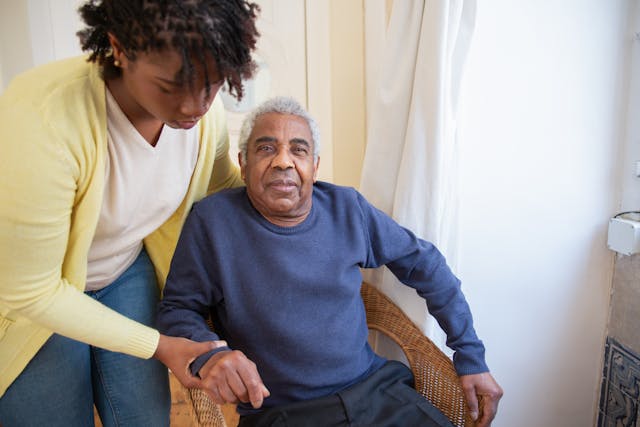What Are The Benefits of Respite Care?

Caring for a loved one is one of the most meaningful roles a person can take on, but it requires a lot of attention, time, and emotional energy. Over time, these responsibilities can begin to weigh heavily and take time away from other important duties. At this stage, respite care would be beneficial as it offers a short-term break from caring, allowing carers to step back and focus on their own mental health and well-being, while ensuring the person they care for remains in a safe and supportive environment.
In this blog, we’ll explore what respite care involves and look closely at the many benefits it brings to both the caregiver and the person receiving care.
Understanding Respite Care Services
Respite care provides short-term support for individuals who have just left the hospital following an illness or operation or while a loved one has a break from their caring responsibilities. Whether it is for a few weeks or a few months, it can have a lasting impact on both residents and family caregivers. This can be planned in advance or arranged in response to an urgent need, depending on your individual circumstances.
There are many respite care options available, such as a care home, day care centres or in their own home. Regardless of the setting, the aim is to provide dedicated care and support to adults while their usual carer takes a much-needed rest.


Respite Care Benefits for Caregivers
For many caregivers, the decision to take a break can be a difficult one and is accompanied by a lot of feelings. It is important to remember that regular breaks are essential for preserving physical and emotional health. Without them, it becomes easy for exhaustion, anxiety, and burnout to set in.
Arranging personalised respite care and taking a break gives family caregivers the chance to focus on other aspects of life, whether that’s spending time with other family members, managing other responsibilities, or simply getting a good night’s sleep. It also provides an opportunity to reflect on one’s own needs, renew energy, and return to caregiving duties with a clearer mind and a stronger sense of balance.
Respite care helps ensure that both the caregiver and the person you care for are supported in the right way. Having a high-quality care home available can reduce stress significantly and provide peace of mind that residents are being supported to the highest degree while they prepare to return to their usual routine.
Respite Care Benefits for Residents
While respite care is often seen as a service that supports carers, it also offers a wide range of benefits for the resident. A short stay in a care home can be an enjoyable and stimulating change of routine as it can help combat social isolation, offer new experiences, and provide a safe environment with around-the-clock support.
Respite care focuses on maintaining the physical health, emotional health and well-being of every resident. Activities are tailored to individual interests, with opportunities to take part in gentle exercise, enjoy meaningful conversation, or simply relax. The supportive environment of a care home means that your loved one is always in safe hands, receiving exceptional care from trained professionals.
Some families also find respite stays useful when thinking about the future. Arranging respite care for a couple of weeks or months can serve as a trial run, giving the caregiver and resident a chance to see what life in a care home is really like. This can make a future transition into full-time care feel more familiar and help decide which care home is best suited to the individual.


What to Consider When Looking For Respite Care
When arranging respite care, it’s important to find a setting that understands the needs of both the carer and the care recipient. Every person is unique, and the care they receive should reflect that. Whether it is emergency respite care or pre-planned, a high-quality care home will take time to develop an individual care plan that considers preferences, medical needs, routines, and personal interests.
For those new to researching care, it may be helpful to speak with your local council or local authority to understand what support might be available. A carer’s assessment or a general needs assessment can help identify the level of support required and what services might be appropriate.
Care home teams are on hand to support residents and their loved ones at every step of the way, and booking a tour can be a brilliant way to see first-hand if it is the right environment for the person you support. It is also a great opportunity for you to ask any questions and receive reassurance from the experts.
Enjoy Exceptional Short-Term Care at Highwood Care Home
At Highwood Care Home in Bideford, we understand the importance of offering high-quality respite care. Whether you’re looking to arrange a short break or want to explore longer-term options, our team is here to support you every step of the way. Alongside our respite care, we also offer exceptional residential care, dementia care, nursing care and palliative care. Please note, our minimum respite stay is 2 weeks.
Our approach to respite care is rooted in compassion, experience and personalised support. From the moment you get in touch, we’ll take the time to understand your loved one’s needs and make their stay as comfortable and enjoyable as possible. With a full activities calendar, home-cooked meals, and a warm community atmosphere, our care home in North Devon offers a safe and supportive environment where your loved one can truly feel at home.
If you’d like to learn more about respite care at Highwood or need help arranging a short stay, get in touch today. We can't wait to meet you and your loved ones.






